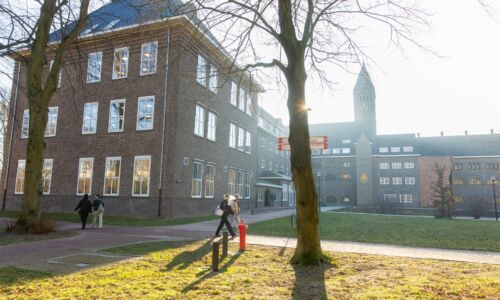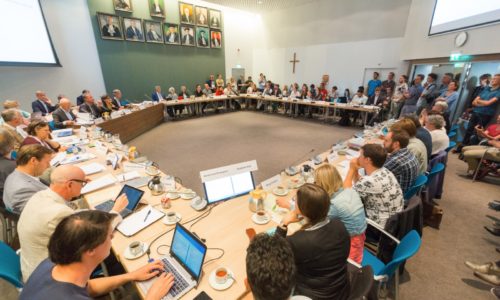Oh, Thuringia
-
 Antonia Leise. Foto: Dick van Aalst
Antonia Leise. Foto: Dick van Aalst
I was born in the Eastern part of Germany. In 1998, that is. My home state of Thuringia hadn’t been part of a dictatorial regime for almost ten years and it, quite frankly, hasn’t been relevant for the past one hundred. Now, almost four years after I have packed my life in boxes and moved five hundred kilometres north, Thuringia has been put on the map. Quite literally. It’s safe to say that not many outside of Germany knew Thuringia’s geographical position a mere two weeks ago and, quite frankly, some people living in Germany probably didn’t know either. Now, the place of my birth and upbringing has received international attention. Naturally, in the worst way possible.
’I want the earth to open up and swallow me whole’, said my mother during our first phone call after the state election in October. The results had just come through, with the right-winged populist Alternative für Deutschland (AfD) second strongest in parliament. Retrospectively, it wouldn’t have been half bad to be swallowed whole back then. So much we could have spared ourselves. An international virus outbreak. Donald Trump not being impeached. And, in this specific case, Thomas Kemmerich’s election as Thuringia’s prime minister at the beginning of February.
Funnily enough, under different circumstances, Thomas Kemmerich, could have even been considered a moderate choice. His party, the FDP, is neither positioned at the far right nor the far left. They’re the liberals. The problem here, however, has not been the political position of Thomas Kemmerich’s party or of the man himself, but the way he has been elected prime minister. Namely, with votes by the Christian CDU and, you guessed it, the AfD.
There are many things that one would need to unpack to get a grasp of the situation. But in short, this is what happened: after the election, it was clear that no realistic political majority could exist due to the distribution of the parties. Which is why neither the candidate put forward by Die Linke (’The Left’), Thuringia’s strongest party and party of the previous prime minister, nor by the AfD, the second strongest party, could have reached the necessary amount of votes during the first two rounds. During the third round, however, when only a simple majority of votes is required to appoint a prime minister, the FDP who barely made it into parliament at all put a third candidate forward. Both CDU and AfD then voted for said FDP candidate — Thomas Kemmerich.
Whether there have been previous agreements between the parties is not clear. What is clear, however, is that the FDP provided a bait, knowing that there was a high likelihood that the AfD would vote with them in order to sabotage the re-election of Die Linke’s candidate. It is also clear that the CDU took this bait, being just as aware of its likely outcome. The national and international outrage following this political manoeuvre has been due to the Thuringian AfD’s links to right-wing extremist, making this indirect coalition the first one with nazis since the fall of the Weimar Republic during the 1930s.
I’m neither a historian nor a political scientist. And even if I was, the mere fact that I’m not clairvoyant means that any comment about the future is, more or less, an educated guess. Will a prime minister elected with help of a fascist-headed party mark the beginning of the end of democracy once again? Has the damage, even though Thomas Kemmerich has since stepped down, irrevocably been done? I don’t know. Simple as that.
’Germany in 2020 is not the Weimar Republic in 1930. The country has a much stronger, a much healthier, democracy now’, says Maurits Meijers — not clairvoyant either, but at least a political scientist — when asked about Germany’s state after the Thuringian election. That, according to Meijers, has been made clear through public outrage following Kemmerich’s election. What happens now, however, is as unclear as ever. Probably new elections as the Thuringian government has shut itself down.
It’s frustrating beyond the limits of my vocabulary. I hate every part of what is happening in my home’s political landscape at the moment — and I know for a fact that many others feel the same. We have promised ’never again’ and now we need to hold our leaders accountable to that promise. Because parties who have never played by the rules of a liberal democracy will not start playing by them if put in positions of power.
Read Antonia Leise's blogs here



Hans Lodder wrote on 10 maart 2020 at 15:02
It was a totally democratic choice, but you did not like the outcome. The AfD has nothing to do with the NSDAP..its only your narrow-minded left frame
Antonia Leise wrote on 10 maart 2020 at 19:39
Dear Hans Lodder,
I agree with you. On paper, it was a perfectly democratic process and, yes, I absolutely did not like its outcome. I didn’t say otherwise at any point. I also did not say that there was a connection between the AfD and the NSDAP. That wouldn’t make sense. Mainly, because the NSDAP has ceased to exist in 1945.
This column criticized the ’playing stupid’ of CDU and FDP and their willingness to get played like fiddles by the AfD. An AfD that, to specify, might be a democratic, but not a liberal democratic party and that, at least in Thuringia, is lead by a politician who has connections to anti-democratic organizations on the extreme right.
This piece was not about a process being undemocratic. It was about the (indirect) collaboration with a non-liberal democratic party led by a person who has anti-democratic tendencies. And it was about questioning how realistic the fear expressed in the media that something like that might lead to a 1930s-German-esque political situation actually is.
I hope that clarifies what this column was about.
Kind regards,
Antonia Leise